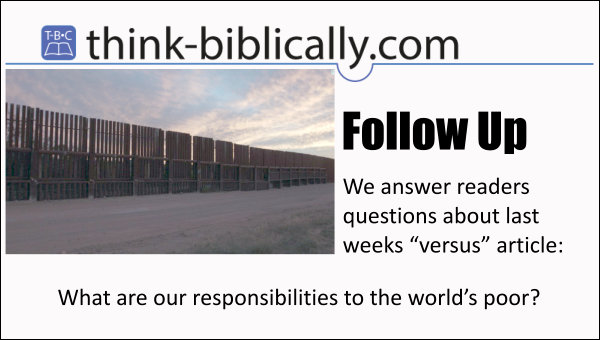By Tyson Thorne

Last Thursday's article Think-Biblically vs. Nancy Pelosi generated more email than any other article to date. The theme of the bulk of those emails was regarding undocumented immigrants and concern for their welfare. Specifically, the question regarding a Christian's responsibility to people in need — but this question was split into two distinct divisions (likely based on the writers perception of illegal immigration). One part of the question was about our responsibility to the needy in general and the other half was regarding a Christian's responsibility to the needy who are lawbreakers. The other big question was what is a Christian nations responsibility to the world's poor?
The first question has an easy answer. Jesus taught us to love our neighbor and, through the parable of the Good Samaritan, that we are to assist those in need to the best of our ability. When we come across someone who is truly poor or in some kind of need, our responsibility is to assist with the means we have. What I mean by "the means we have" is that we are not required to co-sign a loan or go into debt to help a stranger. One more criteria I'll mention is that of accountability. I generally do not give money to street beggars because I know from conversations with some of them that often they are not in need and prefer to stand on the streets to obtain non-taxable income. So be sure the need is real, and find creative ways to help (like paying for a meal or hotel room for them instead of handing over cash).
The second question is a little more nuanced. What if the neighbor we are to love is a criminal? While I know I'll receive more email for saying so, those who enter a country illegally are lawbreakers and, therefore, criminals. Even if a person is a criminal, we have responsibilities to those in need. If a person is wounded, we ought to do what we can for them, including driving them to a hospital if necessary. That said, if we know, or suspect, that they are a criminal we also have the obligation to call the police and report the encounter. In some cases, we may even make a citizens arrest and detain the person until the police arrive (check your states laws regarding making a citizen's arrest before attempting to do so). It depends on what crime is committed and what danger you may be putting yourself in.
The third most asked question was regarding a Christian nation's responsibility to the world's poor. As difficult as our society makes it to believe, America is still a Christian nation. The founders of our country state that the Constitution, the foundation of all our laws, is only useful to a Christian nation. So, for as long as the Constitution remains our standard, America has some responsibilities that other nations do not. That said, God makes a distinction between individuals and states and their respective roles and responsibilities.
An example we've used before is the right to kill someone. Individual Christians are prohibited from revenge killing, even if the person deserves it. Our responsibility is to forgive. The state, however, not only has the right of capital punishment, but the responsibility to use that right when the crime is grievous enough. One of the few responsibilities God gives to government (not individuals) is management of its boarders for the protection of the people.
On a number of occasions God outlined the borders of the land of Israel Genesis 15.18, 17.8, Exodus 1.22, 7.26-8.11 and elsewhere) and King David, of course, was responsible for defending those borders. Even before Israel was a nation, God invented nation states (Genesis 11). At the tower of Babel God scattered the worlds population through the creation of diverse languages in order to keep mankind from organizing under a false universal kingdom rather than pursuing God's universal kingdom. Those who promote borderless countries are promoting what the people at Babel were attempting, something God has deemed to be evil.
So what responsibility does a Christian nation have to the world's poor? The answer is dependent on the circumstance. There isn't time to create a comprehensive policy here, so we'll stick to a few of the common scenarios. For instance, nowhere in Scripture is one nation required to do anything for a people outside its borders, but there are guidelines for such interactions that are intended to bring God glory. In cases of natural disaster — famines, storms, insect invasions — a Christian nation ought to offer humanitarian aid. If a people come to its border claiming persecution, it ought to offer protection but is not required to provide citizenship. A Christian nation has no obligation to people who are poor because their nation is poorly run or their government is corrupt, but may if it can afford to. In every way in which the Christian nation helps the worlds poor, it does so out of the largess that God has blessed the nation with. We ought to testify to this fact, and encourage other nations to follow God too.
